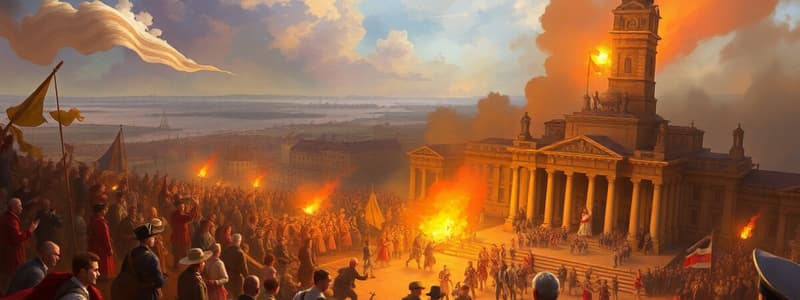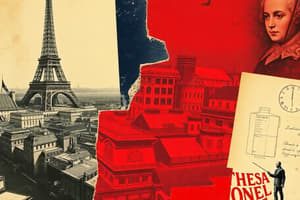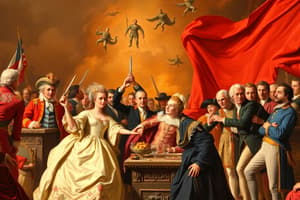Podcast
Questions and Answers
What was the primary demand of the third estate regarding voting in the Estates General?
What was the primary demand of the third estate regarding voting in the Estates General?
They demanded that voting be conducted by the assembly as a whole, with each member having one vote.
Where did the representatives of the third estate convene after walking out of the assembly?
Where did the representatives of the third estate convene after walking out of the assembly?
They assembled in a hall of an indoor tennis court in the grounds of Versailles.
What action did the third estate take on June 20?
What action did the third estate take on June 20?
They swore an oath not to disperse until they had formed a legitimate National Assembly.
How many letters detailing grievances were brought by the representatives of the third estate?
How many letters detailing grievances were brought by the representatives of the third estate?
What was Louis XVI's stance on the voting procedures during the Estates General?
What was Louis XVI's stance on the voting procedures during the Estates General?
What historical event occurred in 1804 related to Napoleon?
What historical event occurred in 1804 related to Napoleon?
What happened to Napoleon in 1815?
What happened to Napoleon in 1815?
What was the purpose of the constitution drafted for France by the National Assembly?
What was the purpose of the constitution drafted for France by the National Assembly?
Who were the main leaders of the movement to draft the constitution?
Who were the main leaders of the movement to draft the constitution?
What influential pamphlet did Abbé Sieyès write?
What influential pamphlet did Abbé Sieyès write?
What event did the angry crowds respond to by storming the Bastille on July 14?
What event did the angry crowds respond to by storming the Bastille on July 14?
What led to the widespread panic known as the Great Fear among the peasants?
What led to the widespread panic known as the Great Fear among the peasants?
What actions did peasants take during the Great Fear?
What actions did peasants take during the Great Fear?
What significant action did women take in response to the rising bread prices?
What significant action did women take in response to the rising bread prices?
How did Mirabeau's background affect his views on feudal privilege?
How did Mirabeau's background affect his views on feudal privilege?
What was the significance of Jacques-Louis David's painting related to the Tennis Court Oath?
What was the significance of Jacques-Louis David's painting related to the Tennis Court Oath?
What are considered 'natural and inalienable' rights according to the text?
What are considered 'natural and inalienable' rights according to the text?
What does liberty consist of, as described in the content?
What does liberty consist of, as described in the content?
What is the role of the state in relation to citizens' natural rights?
What is the role of the state in relation to citizens' natural rights?
How is the law described in regard to the general will?
How is the law described in regard to the general will?
What right do citizens have concerning the formation of law?
What right do citizens have concerning the formation of law?
Under what conditions can a person be accused, arrested, or detained?
Under what conditions can a person be accused, arrested, or detained?
What freedom is granted to every citizen regarding expression?
What freedom is granted to every citizen regarding expression?
What must citizens do regarding the abuse of their liberty?
What must citizens do regarding the abuse of their liberty?
What does Jean-Paul Marat assert about the representation of the people?
What does Jean-Paul Marat assert about the representation of the people?
How is public force and administration expenses funded according to the text?
How is public force and administration expenses funded according to the text?
What proof is given about the influence of wealth on the law?
What proof is given about the influence of wealth on the law?
Under what condition can someone be deprived of property?
Under what condition can someone be deprived of property?
What is the significance of property being described as a sacred right?
What is the significance of property being described as a sacred right?
What does the broken chain symbolize in the context of political imagery?
What does the broken chain symbolize in the context of political imagery?
What is represented by the bundle of rods or fasces?
What is represented by the bundle of rods or fasces?
What does the eye within a triangle represent?
What does the eye within a triangle represent?
What role do symbols play for the majority in the eighteenth century?
What role do symbols play for the majority in the eighteenth century?
Why is just compensation important when depriving someone of property?
Why is just compensation important when depriving someone of property?
What does the phrase 'laws will last only as long as the people agree to obey them' imply?
What does the phrase 'laws will last only as long as the people agree to obey them' imply?
What does the sun's rays symbolize in the context of ignorance?
What does the sun's rays symbolize in the context of ignorance?
What roles did women take on while the men were away fighting?
What roles did women take on while the men were away fighting?
What was the main composition of the Jacobin club?
What was the main composition of the Jacobin club?
Who was the leader of the Jacobin club?
Who was the leader of the Jacobin club?
What fashion choice did Jacobins adopt to distinguish themselves from the nobility?
What fashion choice did Jacobins adopt to distinguish themselves from the nobility?
Why was the Constitution of 1791 criticized by some sections of society?
Why was the Constitution of 1791 criticized by some sections of society?
Flashcards
What was the Estates-General?
What was the Estates-General?
The Estates-General was a French assembly composed of representatives from three estates: The First Estate (clergy), the Second Estate (nobility), and the Third Estate (commoners).
What was the main demand of the Third Estate?
What was the main demand of the Third Estate?
The Third Estate, which included peasants, artisans, and women, demanded a shift from voting by estate to voting by individual, with each member having one vote.
What happened when the king rejected the Third Estate's demand?
What happened when the king rejected the Third Estate's demand?
The Third Estate took a bold step by declaring themselves the National Assembly and vowing to remain until they drafted a constitution, effectively challenging the authority of the king.
What was the significance of the Tennis Court Oath?
What was the significance of the Tennis Court Oath?
Signup and view all the flashcards
How did the Third Estate view their role?
How did the Third Estate view their role?
Signup and view all the flashcards
How did the Third Estate's demands connect to Enlightenment ideals?
How did the Third Estate's demands connect to Enlightenment ideals?
Signup and view all the flashcards
How were the grievances of the Third Estate communicated?
How were the grievances of the Third Estate communicated?
Signup and view all the flashcards
Who were the advocates for constitutional monarchy in France?
Who were the advocates for constitutional monarchy in France?
Signup and view all the flashcards
Who was Mirabeau?
Who was Mirabeau?
Signup and view all the flashcards
What was "What is the Third Estate"?
What was "What is the Third Estate"?
Signup and view all the flashcards
What was the Great Fear?
What was the Great Fear?
Signup and view all the flashcards
What were the peasant uprisings during the Great Fear?
What were the peasant uprisings during the Great Fear?
Signup and view all the flashcards
What was the noble migration during the Great Fear?
What was the noble migration during the Great Fear?
Signup and view all the flashcards
What was the storming of the bakeries?
What was the storming of the bakeries?
Signup and view all the flashcards
What was the storming of the Bastille?
What was the storming of the Bastille?
Signup and view all the flashcards
What were the burning of documents during the Great Fear?
What were the burning of documents during the Great Fear?
Signup and view all the flashcards
What was the Jacobin Club?
What was the Jacobin Club?
Signup and view all the flashcards
Who was Maximilien Robespierre?
Who was Maximilien Robespierre?
Signup and view all the flashcards
Who were the Sans-culottes?
Who were the Sans-culottes?
Signup and view all the flashcards
What is a convent?
What is a convent?
Signup and view all the flashcards
What does 'rationalized' mean?
What does 'rationalized' mean?
Signup and view all the flashcards
Equality before the law
Equality before the law
Signup and view all the flashcards
Aristocrats
Aristocrats
Signup and view all the flashcards
Casting off the yoke
Casting off the yoke
Signup and view all the flashcards
Inviolable right of property
Inviolable right of property
Signup and view all the flashcards
Public necessity
Public necessity
Signup and view all the flashcards
Just compensation
Just compensation
Signup and view all the flashcards
Political symbols
Political symbols
Signup and view all the flashcards
Fasces
Fasces
Signup and view all the flashcards
All-seeing eye
All-seeing eye
Signup and view all the flashcards
Broken chain
Broken chain
Signup and view all the flashcards
Natural and Inalienable Rights
Natural and Inalienable Rights
Signup and view all the flashcards
State's Duty to Protect Natural Rights
State's Duty to Protect Natural Rights
Signup and view all the flashcards
Freedom of Opinion
Freedom of Opinion
Signup and view all the flashcards
Liberty
Liberty
Signup and view all the flashcards
Law's Power to Restrict Actions
Law's Power to Restrict Actions
Signup and view all the flashcards
Law as an Expression of the General Will
Law as an Expression of the General Will
Signup and view all the flashcards
Citizen Participation in Lawmaking
Citizen Participation in Lawmaking
Signup and view all the flashcards
Protection from Unlawful Accusation, Arrest, or Detention
Protection from Unlawful Accusation, Arrest, or Detention
Signup and view all the flashcards
Freedom of Speech, Writing, and Printing
Freedom of Speech, Writing, and Printing
Signup and view all the flashcards
Study Notes
The French Revolution - Summary
- Occurred in 1789, a period of significant change in France
- Paris was in a state of alarm on July 14, 1789 due to rumors of the king ordering the army to fire on citizens
- Citizens formed a people's militia and stormed the Bastille, a fortress-prison, hoping to find arms
- The commander of the Bastille was killed and prisoners released
- The Bastille symbolized the king's oppressive power and was demolished
- Following days saw widespread rioting in Paris and countryside
- Food shortages were a significant factor in the protests
- Historians later viewed this as the beginning of a chain of events leading to the king's execution
- Not anticipated by most people at the time
French Society in the Late 18th Century
- 1774: Louis XVI, the Bourbon King, ascended the throne
- France was heavily in debt from war with Britain and spending on a lavish royal court
- France was divided into three estates: clergy, nobility, and commoners
- The first two estates (clergy and nobility) were exempt from most taxes
- The third estate comprised peasants, merchants, and artisans. They bore the main burden of taxation.
- This inequality fueled widespread resentment
The Struggle to Survive
- Population growth (from 23 million in 1715 to 28 million in 1789) led to food shortages
- Rising food prices, especially bread, led to hardship
- Wage stagnation contrasted with increasing food prices
- Subsistence crises (e.g., droughts, hailstorms) aggravated the situation and intensified protests
- Large gap between the poor and rich worsened the situation
A Growing Middle Class
- Middle class (merchants, manufacturers, professionals) emerged in the 18th century
- They believed in equality and opposed the privileges granted by birth
- Philosophers like Locke and Rousseau influenced the ideas of equality and freedom
The Outbreak of the Revolution
- Louis XVI called the Estates General (a political body) in 1789 to address France's financial crisis
- Voting in the Estates General followed traditional practice, with each estate having one vote
- This was unacceptable to the third estate who demanded voting by head.
- The third estate formed the National Assembly and pledged to create a constitution
- The storming of the Bastille represented the rising popular discontent against the established order
France Becomes a Constitutional Monarchy
- 1791: The National Assembly completed a constitution
- It vested legislative, executive, and judicial powers in separate institutions, thus limiting the king's power
- Active citizens (men who paid taxes equivalent to 3 days' wages of a worker) had the right to vote.
The Declaration of the Rights of Man and of the Citizen
- Fundamental document of the French Revolution
- Proclaimed liberty, equality, and fraternity as natural rights (e.g., freedom of speech)
- Stressed the principle of popular sovereignty.
France Abolishes Monarchy and Becomes a Republic
- The king was imprisoned and later executed
- The Jacobins (a revolutionary political group) took control and established the Reign of Terror
- The Reign of Terror involved mass executions of assumed enemies of the revolution
- A Directory, a new political system, was established to rule France
The Revolution and Everyday Life
- Political reforms also had an impact on everyday life
- Laws introduced freedom of speech and expression; censorship was abolished
- New forms of communication (newspapers, pamphlets) allowed for widespread dissemination of revolutionary ideas
- Revolutionary festivals and celebrations were used to mobilize popular support for revolutionary ideals
Did Women Have a Revolution?
- Women actively participated in the revolution
- They faced economic hardship and limited opportunities
- Women's involvement included participation in protests, political clubs, and demonstrations
- The revolution resulted in some improvements in women's rights but failed to grant full equality
The Abolition of Slavery
- The Jacobin regime abolished slavery in French colonies
- The abolition of slavery was related to the ideals of the revolution, particularly those of liberty and equality
Studying That Suits You
Use AI to generate personalized quizzes and flashcards to suit your learning preferences.




